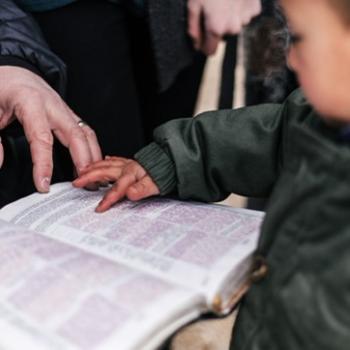Any time I’ve asked a group of church-goers how they feel about their prayer life, the answer is always that it could be better. In fact, I don’t believe even once I’ve heard someone say they’re content in it. Part of the reason for this is simply bound up in the reality that as Don Whitney says, “…when we pray, we tend to say the same old things about the same old things. And when you’ve said the same old things about the same old things about a thousand times, how do you feel about saying them again? Bored!” This really is a tremendous insight that cuts to the heart of much of the issue people face with prayer. Rote repetition is their prayer life—is it any wonder that in the midst of prayer their minds wander to something else, almost as if it is begging for something more engaging. Prayer should be engaging. Yet often it is anything but and we know it, and because we know we are to do it to be faithful, we limp through it out of sheer guilt.
If this describes you and your prayer life, I would earnestly recommend purchasing Don Whitney’s book and putting it into practice. Instead of tasking the reader with multiple steps to a better prayer life, Whitney advocates a simple approach: you pray using scripture as your source, namely, the psalms. The reason being we can avoid vain repetition in our prayers, use inspired text that covers a wide range of emotions, doctrines, and troubles, and initiate the conversation of prayer with God freely. The goal is that our prayers are informed by the Word of God. In essence, we are speaking God’s own words back to Him, and the result is that we not only have biblically saturated prayer, but we know these will be prayers God honors and is honored by. Another great resource that I’d recommend is D.A. Carson’s book, which has a similar proposal utilizing the apostle Paul’s prayers.
Recommendations aside, one of the other reasons I’ve found people struggle in their own prayer life is due to discouragement. Of course, that discouragement can come from theologically flimsy prayers, such as was mentioned above. However, another aspect of discouragement can come in the form of besetting, unconfessed sins (Ps. 66:18), not living with your wife in an understanding manner (1 Pet. 3:7), grieving the Holy Spirit (Eph. 4:30; 1 Thess. 5:19), prevailing doubts (Ja. 1:5-8), lingering anxieties, thanklessness, and a simple lack of prayer (Phil. 4:6-7), unchecked pride (Ja. 4:6; Pro. 3:34), and more. But what of discouragement that can’t be traced to any particular sin to be repented of? What of the self-deprecator? What of the one who constantly beats themselves up over their failures and foibles? What of the individual who struggles to push past every word of revilement and slander? What of the one who has a sort of melancholy for no particular reason?
For this, I believe a brief example from Charles Spurgeon might be helpful to consider. In one breath, Spurgeon could say, “Prayer is doubt’s destroyer, ruin’s remedy, the antidote to all anxieties,” while in another, he could articulate the struggle of so many today by saying, “I am sometimes lifted to the very heavens, and then I go down to the deep: I am at one time bright with joy and confidence and at another time dark as midnight with doubts and fears.” For all his intensity and boldness as a preacher, Spurgeon had a life-long bout with depression that could inflict him even in the midst of ascending to the throne room of his Master. The reasons for this were many—yet suffice it to say, his proclivity towards anxiety and depression were met even in the midst of casting his cares upon His Lord.
On a purely human and anecdotal level, I know of all the times my own mind wanders during prayer, try as I might to keep focused. Often, these wanderings are good roads of continued prayer, yet at some points in my life as a Christian I can recall times where these wanderings were simply expressions of a frustrated and discouraged heart. I can’t help but draw a correlation to the great Prince of Preachers—not in any sense to compare our abilities, but in the commonality we share as finite men with all of the foibles that finite men carry. Our minds are hindered by that which occupies our thoughts—whether distractions, the words of foes, the failures of that given day, the never-ending war with sin that can be so wearying, or even the all-consuming desire to make maximum impact for our King. Likewise, our great enemy is a prowling lion, seeking whom he may devour—irrespective of the stature we have before our fellow men (he was and is still a giant even in death, and I am, well, me). In that same vein, Spurgeon and I share not only the common vexation of a troubled mind and spirit at times, but a common enemy in Satan, whose fiery darts seek to embed and become a perpetual nuisance. Yet our greatest point of commonality is in the common Lord we share, who gave Spurgeon hope and continues to give me hope this day.
Hebrews 4:14-16 speaks to the reality of this common hope we have in Jesus Christ. We are to hold firmly to what we profess, which is the mediatorial role of Christ Himself to reconcile us to the Father. We are to hold to the hope that we have a High Priest who can plead our case perfectly to the Father, yet also in full comprehension of our plight. Why? Because we do not have a High Priest who is unable to sympathize with us in our weaknesses; He was tempted in every way, and yet remained without sin. It is for this very reason that we can enter into the throne room of God with confidence—not in the vehicle of prayer as a means to an end—but as a means to be bound up in Christ, our perfect Advocate and Intercessor who pleads our case before the Father. The purpose of this confidence then is so that we will receive mercy and find grace to help us in our time of need (v. 16). In other words: the author of the book of Hebrews is informing us of his desire that we enter confidently on the basis of Christ’s work, and that in Christ’s work, we will find mercy extended to us by the Father.
The expression here mirrors that of a sovereign king. The king had one’s life and death in their hands and could work it like putty in either direction. Upon entering into the throne room of the king, visitors would bow down and expose the neck—a sign showing all parties understood the king has full sovereign rite to execute the individual. It was a sign of weakness, particularly the weakness of being exposed and vulnerable to one who wielded incredible power. If things went well for the king’s guest, they would live. If not, all the king had to do is motion to their servants and the undesirable visitor would not live to see another day. A veil would be draped over their face so as to bar the visitor from even looking upon the king’s face. Yet the expression we find here in the book of Hebrews paints a radically different story for the one who has access to the King in Christ. Rather than come in trepidation and trembling, they come in confidence. Rather than being veiled and removed for execution, they behold Him face to face through Christ, who is the image of the invisible God (Col. 1:15). If we were not in Christ, the Father would not hear us (Jn. 9:31), but because we are in Christ, He not only hears us, but delights to hear us.
The beauty of this must not be understated, nor can it be overstated. We must remember that in times prior to Christ, only the high priest could enter into the presence of God, and at that, only once a year (Heb. 9:7). We have been given unfettered access to the presence of God because we have been unified with the Great High Priest, Christ—and the access which we have been granted is not one in which we come hesitantly, wondering if the king shall bring the sword upon our neck. We come with access knowing that the king shall lift our chins and only ever continually offer us help in our time of need. This is perhaps the grandest point of all that I could make: prayer is an acknowledgement of our weakness and neediness before a God who delights to help the weak and needy. We still come in frailty before the One who wields ultimate power and sovereignty, yet it is His great joy to have his subjects come into His presence because it is His great joy to condescend to them in loving servitude.
We ought to always bring to remembrance those words of the apostle Peter, who commands we humble ourselves under the mighty hand of God with the explicit purpose that God exalt us in the proper season. The means by which we do so? Casting all our cares, or literally expressed, the worries of our present age, on Him. Why? Because He cares for us. It is His great concern. Our humility before His mighty hand is defined as casting our worldly worries upon Him, and His exaltation of us is defined as caring for us in our time of need. The basis then of our hope in times of discouragement is that whatever may come against us, be it slander, mocking, reviling, persecuting, tormenting, and so on and so forth, does not indicate God’s rejection of us. Instead, it indicates God’s favor upon us. We seldom think of hardship and suffering in such a fashion, but arguably we do not think of it as a blessing because we do not see the positional state in which we are being blessed in it as it drives us to prayer, and as prayer brings us into the presence of God, all because we are found to be positioned in Christ.
Surely—if there is sin you find hindering your boldness to go before the throne, repent. Yet if your trepidation is born out of what seems to be unanswered prayers, self-deprecation, your past failures and current foibles, or even the words of accusation from an enemy, may I humbly suggest you come back to the simplest reason we pray, which is to cast all our cares on Him? Whether or not our cares are answered in the manner we feel they must be, is relatively inconsequential when we recognize the fact that our God delights to help us in our time of need, and indeed He does—even when we do not have the proper words to express ourselves in prayer (Rom. 8:26).
Thus, the idea is not so much that prayer is a magic bullet that removes all barriers to our sinful, human condition, but rather, prayer is the vehicle to the One who removes our barriers. One can very much be found to have a widely varied emotional response. One might even say with Spurgeon, “I am sometimes lifted to the very heavens, and then I go down to the deep: I am at one time bright with joy and confidence and at another time dark as midnight with doubts and fears.” However, if one recognizes that prayer is but the vehicle rather than the destination, they may come to likewise echo Spurgeon in believing that, “All our perils are nothing, so long as we have prayer.”
The simple reason for this is that Spurgeon believed, “The essence of prayer lies in the heart drawing near to God: and it can do that without words.” In other words, prayer is the vehicle by which we commune with God Himself, not in the hopes that all of our troubles are magically whisked away, but that by being found in the presence of our King, we gain a certain boldness and even warmth. In that, we redouble our efforts, trusting not in the vehicle of prayer, but in the destination to which the vehicle brings us, which is in the presence of God Himself. Knowing that this vehicle is the God-ordained means to bring us into the presence of our Lord is what brings hope in the midst of those times where even the vehicle seems to sputter. Why? As Spurgeon himself notes, “Our God not only hears prayer but also loves to hear it.” It is no wonder then when we consider the depth and beauty of this singular truth that we may likewise come to see that prayer is, “..essential to me as the heaving of my lungs, and the beating of my pulse.”
In the end, the mechanism of prayer is the means by which we cast our cares on Him as a child to his earthly father; if more cares are added in the midst of that act, we are given the privilege of yet again bringing our later troubles to Him even in the midst of bringing our former troubles. In that sense then, I believe Spurgeon’s point above is that the act of prayer, by bringing us into communion with God in His throne room, does indeed destroy such things as doubt, ruin, and anxiety—but only because such things are mere trifles in the presence of the King who gladly lifts our chins and takes such burdens upon Himself. If more troubles arise even as He takes our first troubles, He gladly takes these as well, for He is utterly merciful to us in our frailty. He is a good King to His subjects.
Here therein our weakness becomes the very mercy which brings God to act more and more to our benefit, comfort, and aid. We shun weakness, not knowing that it is the fuel by which the vehicle of prayer runs, all of which brings us—whether steadily or shakily—to the throne of grace. At the throne of grace, we stand in confidence before our King because our Mediator, Christ Jesus, stands in our place to represent all of our earthly troubles in earnestness. If we would but recognize these things are simple means by which the object of our prayers is realized, we might just recognize their true beauty. Whether big or small, all prayers are the recognition of the frail coming before the Omnipotent and seeking His aid. It is the recognition of the powerless to come to the all-powerful for that which they cannot do in and of themselves. It is a dependency, not on self, but on God. If an earthly father knows how to come to the aid of his earthly children, even in the misplacing of their silly trinkets, how much greater does your heavenly Father know how to come to the aid of His own children?













